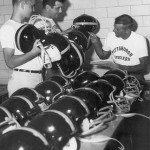Christians giving to other Christians who are traveling from place to place
This is the fourth post in my series on Christians and giving from the perspective of Scripture. (See the introduction post here.) I’ve already stated that giving directly to those in need is the most prevalent method of giving by Christians in the New Testament (either by example or instruction). There are also a few examples of Christians giving indirectly to people who are in need.
Similarly, there are a few examples and exhortations in Scripture of Christians giving to those who are traveling from place to place. These traveling (or itinerant) believers may be apostles, or prophets, or evangelists, or perhaps gifted for some other type of service. The common fact for this type of giving is that the recipients are traveling away from home, and they do not intend to stay in one place.
Of course, Paul is the quintessential example of the itinerant servant in Scripture. It is not surprising, then, that there are many example of him receiving help from other believers. This passage from Philippians is a famous example:
I rejoiced in the Lord greatly that now at length you have revived your concern for me. You were indeed concerned for me, but you had no opportunity. Not that I am speaking of being in need, for I have learned in whatever situation I am to be content. I know how to be brought low, and I know how to abound. In any and every circumstance, I have learned the secret of facing plenty and hunger, abundance and need. 13I can do all things through him who strengthens me. Yet it was kind of you to share my trouble. (Philippians 4:10-14 ESV)
Receiving support from others seems to be a right of itinerant believers. Paul discusses this right in 1 Corinthians 9. This is also the passage where Paul says that he refuses to exercise that right among the people where he is currently working. (Paul accepts money from believers in other locations, but there are no examples of instances in which he accepted support from believers in the location where he is currently serving.) This passage also indicates that there are others (besides Paul and Barnabas) who are traveling from place to place. (See 1 Corinthians 9:4-6.)
Similarly, there are exhortations and instructions in other letters in which believers are encouraged to support other Christians who are traveling through their area. Another famous itinerant support passage is found in 3 John:
Beloved, it is a faithful thing you do in all your efforts for these brothers, strangers as they are, who testified to your love before the church. You will do well to send them on their journey in a manner worthy of God. For they have gone out for the sake of the name, accepting nothing from the Gentiles. 8Therefore we ought to support people like these, that we may be fellow workers for the truth. (3 John 5-8 ESV)
In fact, John later tells Gaius (the recipient of the letter) that he should not follow Diotrephes’ example, partly because Diotrephes refuses to help Christians who are traveling through their area and even attempts to stop others from helping itinerant servants.
Furthermore, the many instructions about practicing hospitality are primarily focused on helping traveling strangers. (For example, see Romans 12:13 and Hebrews 13:2.) There is even a special verb for “sending with hospitality” that is used in several passages. (For example, see Acts 15:3, 2 Corinthians 1:16, and Titus 3:13.)
Again, the important aspects of this kind of giving is that it was offered to people who were traveling from place to place. It seems that as long as the servants were traveling, believers would help them. When they settled down, there is less evidence that the support continued, at least at the same level.
What would you add to this discussion of Christians giving to those itinerant servants who are traveling from place to place?
————————————–
Giving and the Church in Scripture Series:
1) Introduction
2) Christians giving directly to others because of need
3) Christians giving indirectly to others because of need
4) Christians giving to other Christians who are traveling from place to place
5) Christians giving to other Christians in response to some service
Giving and the Church in Scripture
I haven’t written much about giving from the perspective of Christians, the church, or Scripture. This is one of those topics that provokes passionate responses on all sides of the issues. So, I’m going to take a “slow and easy” approach to the topic.
To begin, we should admit that giving (or tithing or offering or whatever you want to call it) is a pervasive issue among many in the church. Most of the mail or email that I get from Christians that I do not know personally is requesting monetary support of some kind. And, we’ve all heard the someone say they will “never attend another church service” because they only want money (or they’re always asking for money).
It appears to many (and often to me) that the church runs on money, and that the main mission of the church is to raise money. (There is even a church in our town that has a “yard sale” at least once per month.) Last week, when we went to the NC State Fair, I lost count of the number of food stands that were run by churches attempting to raise money. (I heard an interview in which one of those church members said the state fair was their primary way to raise money.)
When you read through the Gospels, you find that Jesus said quite a bit about money. However, it seems that Jesus primarily spoke about personal use of money or relying on money instead of God. Similarly, we find Paul writing about money a few times, as well. Paul writes about money for many different reasons.
But, what does Scripture (the New Testament in particular) say specifically in relation to the church and money? I’m going to broaden the question a little: What does the New Testament teach in relation to Christians and giving to others?
I use “giving” instead of money because often in Scripture we find other things (besides money) being given to others. If we limit the question to only money, we would have very few passages to consider. However, when we expand the question to include other ways that Christians gave to others in Scripture, we find several additional episodes.
In the study, I’ve divided the various instances of giving into four different groupings: 1) Christians giving directly to others because of need, 2) Christians giving indirectly to others because of need, 3) Christians giving to other Christians traveling from place to place, and 4) Christians giving to other Christians in response to some service.
I plan to cover each of these “groupings” in a separate blog post. I think it interesting to find many of the “proof texts” used today are actually applied to different types of giving in the New Testament – types of giving that might not be “acceptable” to those using the “proof texts” today.
I’m looking forward to reading your thoughts and insights as I study this topic. Do you have any comments on this introduction, or on the four categories that I’m using in this study?
————————————–
Giving and the Church in Scripture Series:
1) Introduction
2) Christians giving directly to others because of need
3) Christians giving indirectly to others because of need
4) Christians giving to other Christians who are traveling from place to place
5) Christians giving to other Christians in response to some service
Is the priesthood of all believers really that important?
Is the priesthood of all believers really that important? Well, my friend Eric from “A Pilgrim’s Progress” thinks so. He writes about this in his post “Pleading for the Priesthood of All Believers.”
After listing several passages in which all believers are exhorted to do the work of priests, Eric makes a very impassioned and – I think – a very scriptural plea. If you are in Christ, then you are a priest in Christ (the only kind of priest that matters), so do the work of a priest!
Eric writes:
I plea to all followers of Jesus Christ to fully embrace this great privilege and responsibility. Since we have direct access to God, let’s live like it. We don’t need to go through others to get to him. Instead, let’s help others see this incredible news. As we make disciples, let’s be sure to let them know that they have no need of anyone to stand between them and God. Christ alone is our high priest…
Now, the happy reality is that if we are Christians we are priests. There is no choice in the matter. It is fact.
In light of that, let’s live in this reality. Let’s encourage all our brothers and sisters in Christ to grab hold of this wondrous gift. Not only are we saved from hell, but we are saved to a life of direct communication and experience with God Himself.
This is good stuff… important stuff for all believers to understand. You are as much of a priest – and just as “ordained” – as anyone else. Teaching, leading, discipling, exhorting, admonishing, rebuking… these are all within your realm as a child of God indwelled by the Holy Spirit.
And, get this… the church only grows in maturity when ALL believers are working as priests.
When equippers don’t equip
Recently, I had a very interesting conversation with a friend on Ephesians 4 – specifically Ephesians 4:11-12 – “And he [Jesus Christ] gave the apostles, the prophets, the evangelists, the shepherds and teachers, to equip the saints for the work of ministry, for building up the body of Christ…” (Ephesians 4:11-12 ESV)
While I’ve written several posts about the list in Ephesians 4:11. For example, one of my most read posts of all time deals with whether Paul intended to list four or five different types of gifted individuals in the list. Also, I’ve written posts about whether this post in simply a sample of gifted individuals (like all of the other spiritual gift lists) or whether this list in exhaustive.
But, in this post, I want to focus on something else: the purpose of the spiritually gifted individuals listed in Ephesians 4:11. Paul tells us why Jesus Christ gives spiritual gifted individuals to the church in verse 12: “…to equip the saints for the work of ministry, for building up the body of Christ…” (Ephesians 4:12 ESV)
Thus, the work of the apostle, prophet, evangelist, and shepherd-teacher includes equipping (preparing) the church for works of service. While these gifted individuals will naturally work within their giftings, they are also supposed to equip the saints to carry out those same functions.
This is best seen in the spiritually gifted evangelist. From the name “evangelist,” it seems clear that this individually is somehow spiritually gifted to proclaim the gospel of Jesus Christ. But, evangelism is not “equipping the saints for the work of service.” The evangelist does not carry out this function until he or she is almost helping other believers to proclaim the gospel of Jesus Christ.
The evangelist, then, is not carrying out the evangelist’s function ONLY by sharing the gospel. Instead, the work of the evangelist includes teaching and showing others how to share the gospel.
Now, take this same idea into the realm of the apostle, prophet, and shepherd/teacher. Again, these individuals should function within the realm of their particular gifting (by being sent, prophesying, or caring/teaching), but their functions do not end there. They are also to help others understand and live as being sent, to help others listen to God and prophesy, and to help others care and teach.
An apostle who is always going but is never helping others to go is not doing the work of an apostle. A prophet who is always prophesying but is never helping others to prophesy is not doing the work of a prophet. An evangelist who is always sharing the gospel but is never helping others to share the gospel is not doing the work of an evangelist. A shepherd/teacher who is always caring/teaching but it never helping others care/teach is not doing the work of a shepherd/teacher.
The spiritually gifted individuals listed in Ephesians 4:11 are given to the church both to function within their own giftings AND to help others function within those giftings as well. (I would argue this is true for other spiritual gifts also.)
So, how can we tell if we are equipping others? Well, we could start by asking if we are always doing the work that we are gifted at doing, or are we showing others how and giving them opportunities to do the same work.
By the way, if we continue reading in this same passage, we see why it is so important for these individuals to equip the church to do works of service. In Ephesians 4:16, Paul says that the church grows only when the whole church is working together. The church does not grow when only those listed in Ephesians 4:11 are working.
It’s time for equippers to stop doing all the work and start equipping others to work. This means that at times the equippers needs to step out of the way so others can function as God has gifted and prepared them. (If we never feel others are ready, it’s because WE are not equipping them.)
Replay: Running and Maturity in the Church
Two years ago, at the end of the summer of 2009, I wrote a post called “Running and Maturity in the Church.” Margaret (my wife) and I had decided to train to run in a 5k race, mainly to get in shape. It didn’t work out for several reasons. But, getting back into running as exercise helped me understand something about spiritual gifts. I hope you enjoy this post.
——————————
Running and Maturity in the Church
Last Summer, my wife Margaret and I decided to walk together in the mornings. I learned alot about community during our walks together (see my post “Walking Together“).
This Summer, we tried to walk together again. For some reason, we were having a difficult time remaining motivated. Some friends decided that they were going to start training for a marathon in February. I’m not ready to commit to a marathon, but I decided to start training for a 5k in October. (You probably know this already if you follow me on Twitter or read my Facebook status updates.)
So, last week, Margaret and I began training for the 5k. The difference between our 5k training and our walking last summer is that we have to run some for our 5k training. Eventually, we will only run. But, of course, we’re not ready for that yet.
When I was in middle school (we called it junior high school) and high school, I could run long distances. But, years and years of sitting behind a computer screen has taken a toll on my body. I need this exercise and I need to get back in shape, so I’m excited about the prospects. Plus, I’m more motivated now that I have a specific goal: the 5k in only a few weeks, and perhaps a 1/2 marathon in February if everything goes well.
But, I’ve learned something about the body over the last few days that I think is applicable to the church as the body of Christ. When I started running, I realized that my body is not in shape to do what it needs to do. However, it wasn’t every part of my body that was holding me back.
My arms were working just fine, and if I left it up to my arms, I could run for long distances. Similarly, my eyes and ears and nose were very happy to keep running long after I had to stop.
Surprisingly, even my legs and feet were able to carry be farther than I expected. Yes, my legs – especially my calves – would be tired after running. However, if I left everything up to my legs, I could have kept running longer.
But, my lungs would not allow me to run any longer. My breathing is not where it needs to be to be able to run long distances. Therefore, right now, I’m training my lungs and breathing as much as – and perhaps more than – I’m training my legs.
It is very interesting to me that my lungs are hidden from sight. I can’t see them, and they don’t appear to be very important from an outward perspective. But, unless my breathing capacity increases, I won’t be able to run for long distances.
I could spend hours exercising my legs and arms, my chest and abs, but unless I exercise my lungs, I will not be able to do what I need to do.
This reminded me to two specific passages in Scripture dealing with the church. First, consider this passage from 1 Corinthians:
But as it is, God arranged the members in the body, each one of them, as he chose. If all were a single member, where would the body be? As it is, there are many parts, yet one body. The eye cannot say to the hand, “I have no need of you,” nor again the head to the feet, “I have no need of you.” On the contrary, the parts of the body that seem to be weaker are indispensable, and on those parts of the body that we think less honorable we bestow the greater honor, and our unpresentable parts are treated with greater modesty, which our more presentable parts do not require. But God has so composed the body, giving greater honor to the part that lacked it, that there may be no division in the body, but that the members may have the same care for one another. If one member suffers, all suffer together; if one member is honored, all rejoice together. Now you are the body of Christ and individually members of it. (1 Corinthians 12:18-27 ESV)
It is obvious that every part of the body of Christ is important – even those parts that may be less noticeable and may seem less important. In fact, according to Paul, these parts are even more important than we think because God has given those parts greater honor.
Second, consider this passage from Ephesians 4:
And he gave the apostles, the prophets, the evangelists, the pastors and teachers, to equip the saints for the work of ministry, for building up the body of Christ, until we all attain to the unity of the faith and of the knowledge of the Son of God, to mature manhood, to the measure of the stature of the fullness of Christ, so that we may no longer be children, tossed to and fro by the waves and carried about by every wind of doctrine, by human cunning, by craftiness in deceitful schemes. Rather, speaking the truth in love, we are to grow up in every way into him who is the head, into Christ, from whom the whole body, joined and held together by every joint with which it is equipped, when each part is working properly, makes the body grow so that it builds itself up in love. (Ephesians 4:11-16 ESV)
According to this passage, the body grows (matures) when every part of the body is allowed to do its own work – when every part of the body is allowed to do what it is designed to do. We are not the same, but we need each other. From the negative perspective, if one part of the body is not “working properly”, then the body will not mature.
In my illustration from running, if I exercise my legs, arms, chest, etc. then those parts of my body will get stronger, but my body as a whole will not. The church is to be concerned with the maturity of the whole body, not just with their own maturity.
There are times when I need to stop exercising before my legs or arms are completely tired in order to allow my lungs to grow in capacity. There are times when those “more presentable” parts of the church should allow the “less presentable” to work, even if the “more presentable” could “do a better job”. Why? Because by allowing the “less presentable” parts to work, then the whole body is allowed to grow in maturity.
By the way, I’ve also found that when I allow my lungs to dictate how much I can run, my legs actually get a good workout. Those of us in the church who are more “noticeable” may (ummm… will) find that even we grow and learn when we allow the “less noticeable” to do the work. In fact, it is worth it to our own growth and the growth of the body for us to shut up occasionally and to encourage others to speak or serve instead – as long as we’re willing to listen and learn from them.
Replay: Saturday Church?
Three years ago, I wrote a post called “Saturday Church.” In the post, I describe several opportunities that we had to meet with the church on a Saturday. A Saturday? Yes, a Saturday. In Scripture, we see more examples of the church meeting day-to-day than we see the church meeting only on Sunday. Plus, these “church meetings” may not have looked like what you expect…
———————————–
We met with the church several times last Saturday. Several times? Yes, several times. Saturday? Yes, Saturday. And, in a couple of instances, we were meeting as the church going into the world, instead of meeting as the church separated from the world. (See my post “The church meets here“.)
Saturday morning, our family and some friends went to a low income neighborhood where one of our friends lives. (See “Opportunities to serve” and “God works through my wife too“.) Did someone lead singing? No. Did someone “preach a sermon”? No. But, when the church met, we dealt with people’s physical, emotional, and spiritual needs. We only introduced ourselves to some people, and spent alot of time with other people. We helped people understand Scripture, and we prayed with people. Some people reacted with tears, some with smiles, some with gratitude, some with indifference. We attempted to demonstrate God’s love regardless of the people’s reactions.
Saturday afternoon, our family and some friends went to the nursing home to visit with Mrs. Jenny. (See I think we’ve been adopted” and “She said, ‘I’m very close’“.) Again, no one led us in songs, and no one preached a sermon. But we all loved on her and listened to her talk about her week. After a few minutes, everyone left except Margaret and me. We talked to her a little longer, giving her the opportunity to ask us questions about Christ and faith. For the most part, she did not want to ask questions that day. However, she spent several minutes telling us how God had been drawing her to himself. It was almost as if she were evangelizing us!
Saturday evening, some friends invited us and another family to their house for a pancake dinner. Each family brought a griddle, and cooked piles of pancakes, sausage, and bacon. After everyone ate their fill, we sat around and talked about what’s going on in our lives. It is amazing to see how God is at work, in different way in the lives of different people. Again, there was no organized singing or preaching. But, this was certainly an edifying time.
No singing… no preaching… and yet when we met together, we met as brothers and sisters in Christ, with a desire to build up one another toward maturity in Christ and with a desire to demonstrate the love of God toward each other and toward others. I came away from these Saturday meetings with a song in my heart and being taught by word and example how to better follow Jesus Christ – with a better understanding of the Scriptures and what it means to trust God – with a better understanding of what the Spirit of God is doing in my brothers and sisters and in the world around us.
“Whenever you come together… let everything be done for edification.” (1 Cor 14:26)
It’s Sunday, Worship Sunday
My friend Stephanie at “Dead and Domestic” writes beautiful, heartfelt, powerful poems. Often, she writes things that we don’t want to read… or, at least, things that I don’t want to read.
When she shares her own feelings and hurts and depression, it reminds me that there are hurting people all around me. What about the people who are different? Am I caring for them? Am I welcoming them into my life? Or, am I keeping those pains at arm’s length?
Anyway, I hope you will seriously consider her poem below. She sent it to me and gave me permission to publish it here. It’s not a call to reject any certain type of “church”. It’s a call to love people and welcome them into our lives.
——————————————-
It’s Sunday, worship Sunday
Welcome one and welcome all
We have music, food and lectures
And we’re sure you’ll have a ball!
We have some simple rules
You should follow complacently
Please sit down alone, yes by yourself
And do it quietly.
If you’re sad or mad or angry
Leave your problems at the door
We’re too busy having worship
Plus, those things are quiet a bore.
Once we sing a song of praise
A man will come to shake your hand
But sit back down, please hurry
Here comes the worship band.
We have songs of grace and mercy
That we sing with joyful shouts
But if you sing them wrong
Or out of tune
You’re sure to be kicked out.
We’re so glad you chose our church
Because we know we are the best
And we may make you a member
If you pass our many tests.
Oh, and please no jeans or sandals
These clothes will just not do.
Wear a tie or dress and stockings
Anything less would be plain rude.
Once a month we help the homeless
We feed them bread and give them socks
But don’t worry they won’t bother us
We make sure all church doors lock.
A different kind of soup kitchen and a different way of going
Chris at “The Amplified Life” has written another great missional (true) story in his post “Soup for the Soul: A Positive Example of a Local Church ‘Going’.”
In the post, Chris tells the story of a group of Christians who decide to start a soup kitchen to feed people from the neighborhood who are hungry and needy. It doesn’t go so well. Very few people come to the soup kitchen.
So, do these brothers and sisters give up? Nope. They decide to go to the people who are hungry and needy.
Here’s part of the story:
A little while ago a layperson from the church approached Ken and asked if they could start a weekly soup kitchen from The Hub. Ken’s response was great. He basically said, “Build a team and go for it, but you lead it.” They called the ministry Soup for the Soul. For the first few weeks they either had no one show up or only about 1 or 2 people show up to receive a meal. Then the leadership of this ministry realized something. No one is coming but there is a low income apartment complex two blocks away. What if we take the food to them?
This began a great change. For weeks now Soup for the Soul, which is completely lead by laity, went from serving 0-2 people each Wednesday evening to serving 30-40 people each Wednesday evening! They spend time with the residents. They pray with the residents. They have distributed about 10 Bibles. The residents of this apartment complex look forward to this church arriving every Wednesday. This church is loving on the people of this apartment complex.
What a great story! And, notice, this is a traditional church. It is not an organic/simple church. That makes it even better!
I love to see people moving beyond what is expected and going out to the people who need to the love of Christ!
Read the rest of Chris’ short article and notice the two positive examples he takes from this true story.
Replay: What Kind of Fruit?
Three years ago, while studying the Gospel of Matthew with the church, I wrote a post called “What Kind of Fruit?.” The purpose of the post was to examine what Jesus referred to as “fruit.” What exactly did Jesus mean when he said the “righteous” would “bear fruit”?
———————-
In my previous post “Missing the message in the details?“, I mentioned that there is a common theme running through the end of the Sermon on the Mount. That theme is the importance of “fruit” or doing good deeds. In fact, that theme actually begins at the start of the Sermon on the Mount when Jesus tells his listeners – and us – to let your light shine before men.
But, when Jesus is talking about good deeds, shining our light, and bearing fruit, what kind of fruit is he talking about? Can we do anything and call it “fruit”? Do we get to decide what is a good deed? Can we define “letting our light shine”?
In the Gospel of Matthew, Jesus points toward his own actions of healing diseases, casting out demons, restoring sight to the blind, etc. as examples of good deeds. When he sends the twelve out in chapter 10, he tells them to do the same things. Is this what Jesus desires from us? Do we love others only when we are healing diseases and casting out demons?
I think, as we continue to read through Matthew’s Gospel, we’ll find something much simpler involved in doing “good deeds”. Remember the very popular passage in Matthew 25:
Then the King will say to those on his right, ‘Come, you who are blessed by my Father, inherit the kingdom prepared for you from the foundation of the world. For I was hungry and you gave me food, I was thirsty and you gave me drink, I was a stranger and you welcomed me, I was naked and you clothed me, I was sick and you visited me, I was in prison and you came to me.’ Then the righteous will answer him, saying, ‘Lord, when did we see you hungry and feed you, or thirsty and give you drink? And when did we see you a stranger and welcome you, or naked and clothe you? And when did we see you sick or in prison and visit you?’ And the King will answer them, ‘Truly, I say to you, as you did it to one of the least of these my brothers, you did it to me.’ (Matthew 25:34-40 ESV)
The actions that the King (God) desires to see in the “righteous” are simple acts that demonstrate the love of God to those who most need it: some food and drink, a place to live, clothing, and relationships.
Instead of taking this passage at face value, we usually change it to one of two extremes. While the remainder of this post probably belongs to my “Scripture… As We Live It” series, I wanted to discuss this in more detail. Consider the following “re-mix” of Matthew 25:35-36:
For I was hungry and you sent in a tax deductible donation, I was thirsty and you started a Bible study, I was a stranger and you built a new building, I was naked and you gave some clothing to the Salvation Army, I was sick and you attended a prayer meeting, I was in prison and you sent a letter to your congressman complaining about the prison system.’ (Matthew 25:35-36 re-mix)
We often spiritualize or depersonalize this Scripture. By starting or supporting “ministries” we make ourselves feel better. But, when we separate ourselves from the people who actually need the help – when we keep from showing the love of God personally – then we are not living as God would have us live. Yes, it is fine to support “ministries” – my family does this – and yes, it is fine to start Bible studies and prayer meetings – we do this as well. But, we cannot do this in place of personally giving drink to the thirsty, food to the hungry, clothing to the naked, and visiting the sick and imprisoned.
Another way of depersonalizing the love of God is by dealing with “social causes” instead of hurting individuals. For example, instead of giving drink to a thirsty woman, we join a cause to provide clean drinking water. Instead of giving food to a man who is hungry, we give to a relief effort to end world hunger. Instead of giving clothes to a young child who has nothing to wear, we support a local “clothes closet”. Yes, we can and we should support these “social causes”. But, we cannot support “causes” at the expense of neglecting thirsty, hungry, naked, sick, and imprisoned individuals.
What kind of fruit does God expect? I think he expects the kind of fruit that demonstrates his love on a person by person basis… the kind of fruit that touches and hugs and listens and watches and learns and helps… the kind of fruit that grows through sweat and tears and dirty hands.
God loves people. And, he wants his children to look into the eyes of other people and love them.
What does it mean to lead among the church?
In Scripture, several terms are used to describe leaders. One term, of course, is “leaders” (or the verb form “leading”). (Luke 22:26, Acts 15:22, 1 Thessalonians 5:13, Hebrews 13:7, Hebrews 13:17, Hebrews 13:24). Other terms such as “elders” and “overseers” are also used to refer to those who are leaders among the church. (Acts 14:23, Acts 15:2-6, Acts 15:22-23, Acts 20:17, Philippians 1:1, 1 Timothy 3:2, 1 Timothy 5:17, Titus 1:5-7, 1 Peter 5:1)
There are other terms that are often associated with leaders among the church. (apostles, teachers, pastors/shepherds) However, these terms are generally related to spiritual gifts, and not necessarily with leading. (Although, anyone exercising any spiritual gift for the purpose of serving others could be said to be leading others as well.)
As we consider what it means to lead from the perspective of Scripture, there are a few points that we should start with. First, the writers of the New Testament never use the term for “ruler” when referring to a follower of Jesus Christ, despite some unfortunate translations especially of Hebrews 13:17. Second, the authors of the New Testament never say that one brother or sister is “over” another brother or sister (or a group), again despite some unfortunate translations especially of 1 Thessalonians 5:12-13. Third, in Scripture, leading is never about making decisions for others.
So, what is leading among the church? According to Jesus, there is one overriding trait of any who lead among the church. What trait is that? Service. I’m not talking about “servant-leadership;” I’m talking about service. As Jesus said, “Let the greatest among you be as the youngest and the leader as the servant.” (Luke 22:26) Jesus, as the ultimate leader, said of himself, “Even the Son of Man came not to be served but to serve.” (Matthew 20:28). It is perhaps most important that these last two statements were made in the context of two of Jesus’ followers jockeying for position among the others.
Thus, if someone wants to be a leader among the church, they must begin (and end) with serving others. When people begin following your example of serving others, then you are a leader in the way that Jesus defined leadership. Also, when you follow someone because they are serving others, then you are following a leader in the manner that Jesus instructed. For the church, leading = serving. Nothing more, and nothing less.
But, what about the importance of the character of leaders? Yes, Paul lays out several characteristics of those whom the church recognizes as leaders (whether they are called “elders” or “overseers” or even something else). You can find these characteristics in 1 Timothy 3:1-7 and Titus 1:5-8. The characteristics listed in these passages are the same as characteristics listed in other sections of Scripture for all believers. Even the famous “able to teach” description refers to all believers, who are responsible for teaching one another. (For example, see Matthew 28:19-20, Colossians 3:16, 1 Thessalonians 5:14.)
Thus, the church recognizes (some say “appoint”) leaders when they live in a manner that all followers of Jesus Christ should live. What is the purpose for recognizing these leaders? The church does NOT recognize leaders so that the leaders can do all the work or even all the important work. Instead, the church recognizes the leaders so that the church know whose example to follow.
And, this leads me to the final important aspects of leaders among the church. As Scripture points out (especially through Peter in 1 Peter 5:1-3), leaders do not control people nor do they exercise authority over people. Instead, their influence is their the way they live their lives. The way they follow Jesus and trust God is to be an example for other believers, especially those who are immature in the faith.
The importance of example is also seen in Hebrews where the author says, “Remember your leaders, whoever spoke the message of God to you, carefully examining the outcome of their way of life in order to imitate their faith.” (Hebrews 13:7)
Again, among the church, leading is not making decisions or controlling others. Leading is serving and living as an example of what it means to follow Jesus Christ and trust God.
(By the way, the image attached to this post is my favorite image related to leading among the church. If we are not serving people – getting our hands dirty – then we are not leading.)










